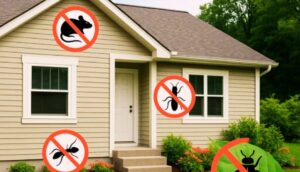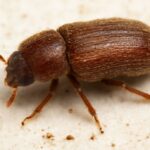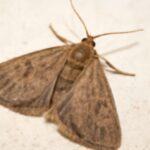Natural Remedies For Spring Pests [Infographic]
Insects can cause damage to your garden, home, and other structures, sometimes leading to expensive repairs. But the good news is, you can take simple, safe steps to keep these pests under control before they become a big problem.
Some insects prefer to live in groups, building colonies that grow quickly and become harder to manage. Others tend to wander alone, but no matter the type, early prevention is key to stopping them from spreading.
Understanding how common pests behave helps you make smart choices to protect your space. Using natural remedies and good maintenance habits can significantly reduce the chances of an infestation.
This guide is here to walk you through practical ways to handle pest issues in your garden and home. With the right approach, you can create a pest-free environment that’s comfortable and safe.
Managing pests isn’t just about protecting your property—it’s about peace of mind and enjoying your space without worry. Follow these steps to keep unwanted insects at bay and live stress-free.

10 Frequently Asked Questions (FAQs)
1. What are the most common spring pests I should watch out for?
Spring brings warmer weather—and unfortunately, pests too! The most common ones include ants, mosquitoes, flies, termites, aphids, and wasps. You may also spot spiders, fleas, and ticks becoming more active as temperatures rise.
2. Are natural remedies really effective against pests?
Yes, they can be surprisingly effective! While they might not provide the instant kill like chemicals, natural remedies help repel, deter, and disrupt pests without harming your family, pets, or the environment. Consistency is key, and they work best as part of an overall prevention plan.
3. Can I use essential oils to repel bugs in spring?
Absolutely! Many pests can’t stand certain scents. For example:
-
Peppermint oil keeps ants and spiders away.
-
Lavender oil repels moths and fleas.
-
Lemongrass or citronella oil helps drive off mosquitoes.
Mix a few drops of lemongrass or citronella oil with water and spray apply around doorways, windows, and baseboards for natural protection.
4. What’s a natural way to keep ants out of my kitchen?
Try vinegar and water spray! Mix thoroughly equal parts to wipe down counters, entry points, and trails. Ants hate the strong scent and acidity. You can also sprinkle cinnamon or coffee grounds near doors and windows to block their path naturally.
5. How can I stop mosquitoes from breeding in my yard naturally?
Start by eliminating standing water, where mosquitoes love to breed. Then try:
-
Adding mosquito-repellent plants like basil, marigolds, and citronella.
-
Placing coffee grounds in birdbaths or puddles—mosquito larvae can’t survive in it.
-
Using garlic spray around your garden; mosquitoes dislike the strong smell.
6. Do any natural remedies work for repelling wasps?
Yes! Wasps hate clove, geranium, and lemongrass oil. Mix them with water and dish soap to create a spray for eaves, patios, or any wasp-prone area. You can also hang a brown paper bag shaped like a wasp nest—wasps are territorial and usually steer clear of what looks like another nest.
7. What’s a pet-safe natural flea treatment for spring?
You can use food-grade diatomaceous earth (DE). It’s a fine powder that kills fleas by drying them out—totally safe for pets when used correctly. Sprinkle it on pet bedding, carpets, and along baseboards, let it sit for a few hours, then vacuum thoroughly. Just be sure it’s labeled food-grade!
8. How can I keep flies out of my home using natural methods?
Flies hate strong smells like vinegar, eucalyptus, and basil. Try this:
-
Set out apple cider vinegar traps (vinegar + dish soap in a cup).
-
Grow potted basil or mint near windows.
-
Hang clove-studded citrus fruits in your kitchen—it repels flies and smells amazing!
9. Can I naturally deter termites in the spring?
Yes, and early action is important. Termites dislike orange oil, neem oil, and borax. You can:
-
Spray orange oil on suspected wood areas.
-
Use borax powder in cracks or create a borax spray.
Also, keep wood piles off the ground and check for moisture—termites love damp wood.
10. What’s a good all-purpose natural pest repellent for spring?
Mix up this DIY all-natural spray:
-
1 cup water
-
1 cup white vinegar
-
10 drops peppermint oil
-
10 drops tea tree or eucalyptus oil
-
A dash of dish soap
Spray around entryways, window sills, under sinks, and outdoor sitting areas. It smells fresh and keeps multiple pests like ants, spiders, and flies away!
Conclusion
Spring should be a time to enjoy blooming flowers, fresh air, and sunny days—not swatting at bugs or worrying about infestations. Luckily, with a few simple, natural remedies, you can keep common spring pests like ants, mosquitoes, flies, and fleas at bay—without harsh chemicals or toxic sprays.
Whether you’re using essential oils, vinegar solutions, or garden-friendly plants, these eco-friendly methods help protect your home, yard, and pets while also caring for the environment. Just remember: consistency is key, and combining prevention with natural deterrents gives you the best results.
So this spring, take the natural route to pest control. Your home will smell better, feel safer, and stay comfortably pest-free—all season long!










Hello Norman!
Thank you for your comprehensive guide on natural remedies for spring pests. Your emphasis on eco-friendly solutions is both timely and essential for those of us looking to maintain a healthy home environment without relying heavily on chemicals. I particularly appreciated your suggestions on using essential oils and natural deterrents to manage common springtime invaders. It’s empowering to know that there are effective, natural methods available that are safe for both our families and the environment.
I’m curious, have you found certain natural remedies to be more effective in specific climates or regions? For instance, do some essential oils work better in the dry heat of Arizona compared to more humid areas? Additionally, how do you recommend integrating these natural methods with traditional pest control practices for a more holistic approach?
Looking forward to your insights and any additional tips you might have!
Angela M 🙂